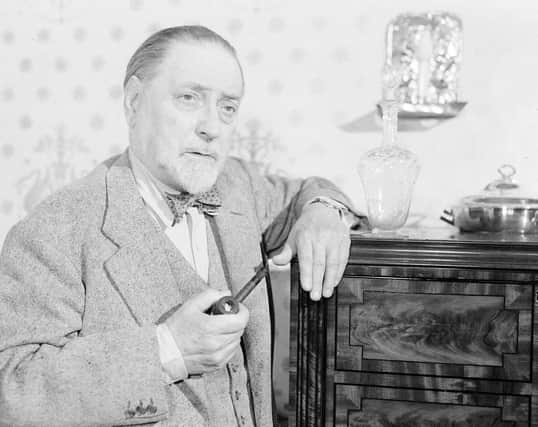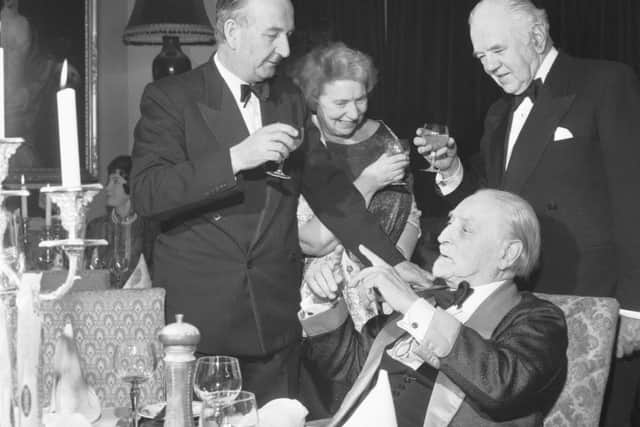Compton Mackenzie: SNP co-founder and Whisky Galore author


Sir Compton Mackenzie is today best remembered for writing two comic novels set in Scotland - The Monarch of the Glen, which inspired the BBC drama series of the same name, and the much-loved Whisky Galore, which has twice been adapted for cinema.
The story of a fictional Hebridean island taking advantage of a ship wreck full of spirits at the height of wartime rationing has entertained generations since it first appeared in 1947. The most recent cinematic version, starring Gregor Fisher, goes on general release in May.
Advertisement
Hide AdBut Mackenzie was much more than a gentle chronicler of the Highlands and islands in the mid-20th century. Even in a series called Remarkable Voices, his life stands out as exceptional in its sheer variety. He was, at various times, an actor, soldier, Government spy, political activist, journalist, Jacobite supporter, cultural commentator, snooker enthusiast, raconteur and, in 1928, a co-founder of the National Party of Scotland - the forerunner to the modern SNP.


Born in the north-east of England, he was a committed Scottish nationalist all his adult life. Andro Linklater, who wrote a biography of Mackenzie, commented: "(He) wasn't born a Scot, and he didn't sound like a Scot. But nevertheless his imagination was truly Scottish."
Edward Montague Compton Mackenzie was born in West Hartlepool in 1883 and raised in London. His was a theatrical family - many of whose members used Compton as their stage name. His grandfather Henry Compton was a well-known Shakespearean actor of the Victorian era.
A history graduate of Magdalen College, Oxford, the young Mackenzie published his first novel in 1912 but his writing career was stalled by the outbreak of war. He quickly signed up and saw action at Gallipoli. In 1915 he was recruited into the fledgling Secret Service and was posted across the eastern Mediterranean.
Although he would later be awarded a knighthood, Mackenzie was no darling of the British establishment. In 1932 he was hauled before the courts and fined for breaching the Official Secrets Act for writing Greek Memories - a candid reflection of his time as a spy. At a time when the British public was scarcely aware of the security services, Mackenzie freely outlined its organisation. It was withdrawn from sale and was only published in full as recently as 2011.


Sir John Scarlett, who retired as MI6 director general in 2010, told the Telegraph he sympathised with Mackenzie's plight. “Compton Mackenzie was effective in Greece in the First World War and did a lot of good work,” he said. “At the same time he was flamboyant and extremely expensive so not really sustainable with the funds at his disposal. He was a showman and he wanted to tell his story, and that is very difficult.”
Advertisement
Hide AdIn 1933 he took revenge on the Secret Service with Water on the Brain, an obvious swipe at the Service. Despite its satirical cover, he managed to include a few genuine morsels - such as the fact that the chief of the Service always wrote in green ink. At story’s end, the location of the Secret Service’s headquarters is revealed in a spy thriller and the spooks have to move out. The building becomes an asylum for "the servants of bureaucracy who have been driven mad in the service of the country".
By this point Mackenzie was already resident in Scotland and had become close friends with the poet Hugh MacDiarmid and the influential writer, thinker and adventurer Robert Cunninghame Graham. Together they helped establish the National Party of Scotland in 1928, which emerged in 1934 as the modern SNP.
Advertisement
Hide AdSir Compton Mackenzie, seated, enjoys a glass of champagne with family and friends during his 85th birthday party in January 1968
Mackenzie settled on the Hebridean island of Barra and concentrated on his most ambitious project, The Four Winds of Love. Gavin Wallace, another of his biographers, later wrote: "The Four Winds of Love, published in six volumes between 1937 and 1945 and containing almost 1 million words, is one of the most ambitious Scottish novels of the twentieth century, an enormous historical odyssey which anatomizes the politics of peripheral nationalism both throughout Europe and in Britain, again through semi-autobiographical character development."
But it was Mackenzie's comic novels that won him UK-wide fame and fortune. Whisky Galore, based on a real-life incident in Eriskay in 1941, was first adapted for the big screen by Ealing studios and released to popular acclaim in 1948. The enduring appeal of the novel was later summed up by one Scotsman literary critic: "So what if it perpetrates the old, cliched 'Brigadoon' myth? Scots, English, American or Martian, no-one can resist this tale of ill-gotten whisky gain on a Scottish island in wartime. It's simply hilarious."
Such was Mackenzie's status as an elder statesman of letters he was knighted in 1952 and remained a much-respected cultural commentator for the rest of his life. In later years he lived in Drummond Place, in Edinburgh's New Town, where he died from cancer aged 89, in 1972.Lavish tributes followed. Dr Robert McIntyre, president of the SNP and the first Scottish nationalist elected to parliament, described Mackenzie as "the Grand Old Man of Scotland". Novelist Eric Linklater said he was a "consummate stylist, who, unlike most writers, also lived with style."